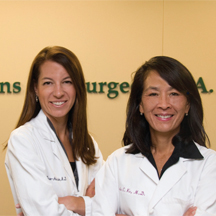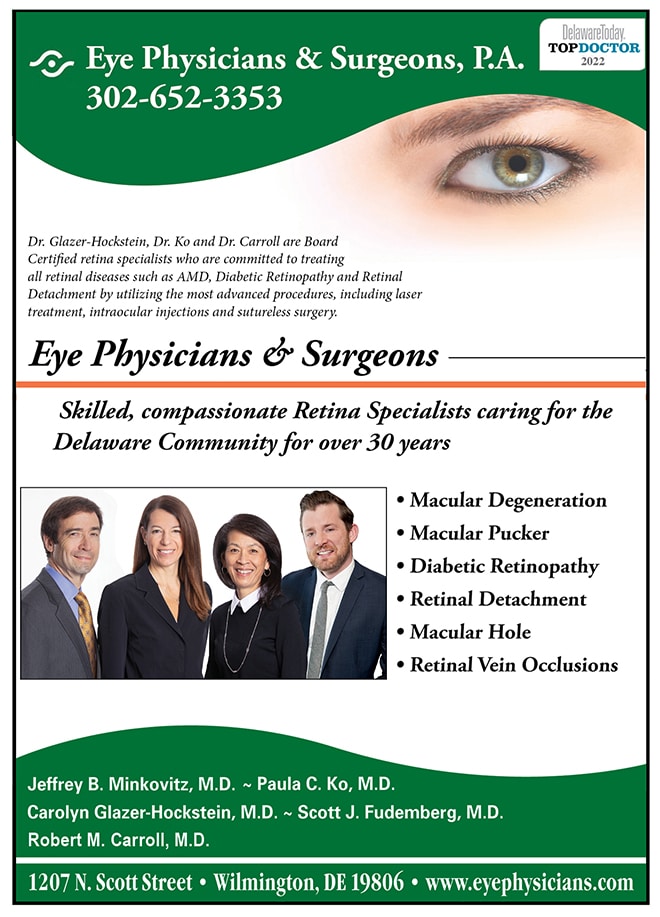An Exciting New Treatment Approved for Dry Macular Degeneration
By Dr. Paula C. Ko, M.D.
Age-Related Macular Degeneration is the leading cause of blindness in the United States in patients aged 65 and older. There are two forms of macular degeneration: wet and dry. Up until now, there was only treatment for the wet form of macular degeneration. In Wet AMD, patients get injections on a regular basis that prevents leaking and bleeding in the macula. The injections dry up the leaking blood vessels and in turn, commonly improves vision in patients with wet AMD. These injections have been available for about 15 years and are very successful in treating wet AMD. The names of the drugs available for wet AMD are Avastin, Lucentis, Eylea and Vabysmo.
Recently, Apellis Pharmaceuticals, a global biopharmaceutical firm, announced the FDA approval of Syfovre. This new drug is a complement-inhibitor and treats geographic atrophy which is a more severe type of dry AMD. Complement is a protein in the blood associated with inflammation. When complement is overly active, it can cause geographic atrophy in the macula. Syfovre is injected into a patient’s eye on a monthly basis. The drug will slow down the progression of geographic atrophy and thus slow down the progression of vision loss.
When a patient has dry AMD, they do not have leaking and bleeding. They have vision loss from drusen, which are aging spots in the retina, and damage to the nourishing layer below the retina. In some instances, patients with dry AMD also have geographic atrophy which is where the nourishing layer of the retina dies out and central vision is lost as the macula cannot function without its nourishing layer. These are the people with dry AMD who will benefit from Syfovre. When someone has geographic atrophy, the natural progression of a patient’s vision is to slowly decrease over time, on average approximately 2.5 years till atrophy starts to affect vision. The injection will slow down the progression of a patient’s vision loss, but unlike treatments for wet AMD, Syfovre does not improve vision. Despite this, Syfovre, is a revolutionary new treatment as this is the first treatment available for dry AMD with geographic atrophy.
Syfovre has been available since spring of 2023 and is becoming more widely used over the last year. If you have dry AMD with geographic atrophy, ask your ophthalmologist to see if you are a candidate. You can follow us on facebook, instagram, and our website at www.eyephysicians.com.
Bios
Paula Ko, MD is a proud partner at Eye Physicians and Surgeons in Wilmington and Dover, DE for the last 28 years. Dr. Ko graduated Cum Laude from the Ohio State University College of Engineering and received her M.D. degree from the Ohio State University College of Medicine, with honors. Following her residency in Ophthalmology at Temple, Dr. Ko served a prestigious fellowship at Georgetown University in diseases of the retina and vitreous and is Certified by the American Board of Ophthalmology. Dr. Ko’s area of expertise is in retinal problems, especially diabetic eye disease, macular degeneration, and retinal detachment. She lectures extensively and has published many papers on these topics. Dr. Ko is active in resident training and is on staff at Temple University, as well as at the Medical Center of DE. She is at the forefront of ophthalmic technology, and utilizes the most advanced procedures, including laser treatment, suture-less surgery and intraocular injections, in the care of her patients. Dr. Ko has also been voted Top Doc by her peers in Delaware Today Magazine for multiple years.
Dr. Glazer-Hockstein graduated Cum Laude from Jefferson Medical College. She was a member of the Hobart Armory Hare Honor Medical Society and was elected to the Alpha Omega Alpha Honor Society. She also received the Carol R. Mullen prize in ophthalmology. She completed her residency at the Scheie Eye Institute, University of Pennsylvania. During that time she was elected Chief Resident. After residency, Dr. Glazer-Hockstein completed a two years medical retina fellowship at the Scheie Eye Institute, University of Pennsylvania. Her research has been published in journals such as the American Journal of Ophthalmology, Journal of Musculoskeletal Medicine, and Retina. She has also presented at national and international conferences. Her specialization includes but is not limited to: macular degeneration, retinal vascular disease, and diabetic retinopathy. Dr. Glazer-Hockstein was recognized as a Top Doc in ophthalmology in Delaware Today magazine for 2012, 2016-2018 and 2022.
Eye Physicians & Surgeons, P.A. 1207 North Scott Street, Wilmington, Delaware 302-652-3353 eyephysicians.com
follow us on facebook & instagram



